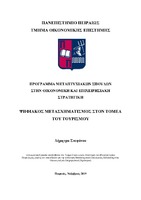Ψηφιακός μετασχηματισμός στον τομέα του τουρισμού
Digital transformation in tourism sector

View/
Keywords
Ψηφιακός μετασχηματισμός ; Τεχνολογία ; Τουρισμός ; Μέσα κοινωνικής δικτύωσης ; Διαδικτυακές κριτικές ; Διαδικτυακά συστήματα κρατήσεων ; e-Tourism ; e-WOM ; m-Tourism ; Ψηφιακές τάσεις στον τουρισμό ; Εμπειρία πελάτηAbstract
This Thesis is the final project in the framework of the Postgraduate Program in Economic and Business Strategy of the University of Piraeus, on "Digital Transformation in the Tourism Sector". This Thesis discusses the importance of digital transformation for the tourism industry, the significant digital trends and the digital achievements made in this field.
Ιn the first chapter, it is presented the concept of tourism, the basic and alternative forms of tourism and a brief analysis of the present and future situation which is expected in this field. In addition, an extensive analysis is carried out in the Greek tourism industry, as it is one of the main pillars of its economy. Of great interest is the impact of tourism on the country's revenues, GDP and the number of workers employed in this sector. Finally, it is shortly presented the role of technology in the tourism industry.
The second chapter deals with digital transformation in general. Specifically, this term is defined and it is made a historical overview. Then, the advantages and disadvantages of digital transformation are presented, as well as its importance and its threats. Following are the three main dimensions and forms of the customer experience, as it is very important for businesses nowadays. In addition, it outlines its key pillars, the "journey" that businesses need to make to transform digitally and the obstacles they face in implementing it. At the end of the second chapter, it is analyzed the digital transformation in Greece, both in the public and private sectors, as well as the main causes of its slow growth in the country.
In the third chapter, it is analyzed the digital transformation in the tourism sector and the digital trends that are expected to take place in this industry in the future. In addition, it is presented the role of social media and online reviews in the tourism sector, as well as the way they have influenced it. Next, it is analyzed the evolution of booking systems over the years and how internet and digital media have transformed the way bookings are made. Furthermore, there is being a talk about the digitally empowered customer, his habits and his experience in the tourism businesses. At the end of the third chapter, it is presented the levels of digital transformation of Greek tourism businesses and also their performance compared to other countries.
The last chapter presents the research made in the framework of this Thesis, the methodology followed, the way the sample selected and its main purpose. In particular, the purpose of the research is to examine the impact of digital technology and its rapid evolution, on the tourism industry in accordance with consumer opinion. Finally, its results are analyzed and some conclusions are drawn which fully agree with the theories analyzed throughout the project.

